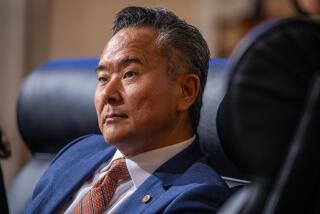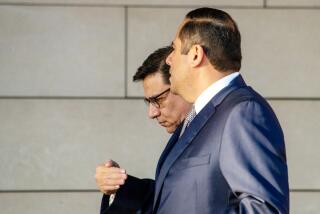Tucker Admits Receiving $10,000 Fee for Letter Backing Project : Trial: He testifies he was acceding to a ‘non-negotiable demand’ by businessman who retained him as consultant.
- Share via
U.S. Rep. Walter R. Tucker III admitted Tuesday that while serving as Compton’s mayor in 1992 he wrote a letter of support for a proposed $250-million waste conversion plant in exchange for a $10,000 consulting fee.
Testifying in his own defense on federal extortion and income tax fraud charges, the Democratic congressman said he tried to avoid getting embroiled in a conflict of interest while working as part-time mayor and as adviser to the businessman behind the project.
But he said businessman John Macardican, who was doubling as an FBI undercover operative, made the letter a “non-negotiable demand” for Tucker’s continued employment.
Tucker contends he was the victim of government entrapment by an overzealous informant.
“No way could I argue with someone who had made up his mind,” he told the U.S. District Court jury.
The letter of support, written on official stationery, was sent to John Stewart, president of the Compton school board, and was signed by Tucker as mayor. It noted that Macardican’s firm, Compton Energy Systems, soon would be requesting a meeting with the board to discuss buying some school district land for a site and vouched for the project as “an efficient, safe and economical answer to the worsening trash disposal problem in the region.”
Tucker added that the City Council would consider granting permits for the project “but is unable to do so until a specific site has been selected.” The government contends that Tucker’s letter was quid pro quo for a bribe. All told, Tucker is accused of extorting $30,000 and soliciting another $250,000 in bribes from Macardican’s firm.
He also is accused of extorting $7,500 from Murcole Disposal Inc., Compton’s residential rubbish hauler, and of failing to pay taxes on the alleged bribes and other income.
Since he took the stand in his defense last week, Tucker has acknowledged receiving payments from Macardican but has maintained that they were obtained legitimately.
He testified that $20,000 was obtained in return for services as Macardican’s adviser on how to lobby the school board.
On Tuesday, he said the remaining $10,000 was a personal loan that he solicited from Macardican in late June or early July, 1992, when he found himself in financial straits.
“John said he would see what he could do to help me,” the 38-year-old Tucker said.
A few weeks later, Tucker said he learned that the City Council had on its agenda a resolution granting Macardican’s firm exclusive negotiating rights for the project.
“I started thinking, here’s something I’ve been involved with, at least on an advisory level.” So, he said, “I told the city attorney I was concerned about a conflict of interest with the upcoming vote.”
Testimony ended for the day before Tucker was asked what response he got from Wesley Fenderson Jr., then city attorney. Fenderson died in office in 1993. Tucker voted in favor of the exclusive negotiating agreement.
Tucker also gave his account Tuesday of the circumstances surrounding an alleged $250,000 bribe he sought in 1991 from Robert Kelly, a pseudonym used by former FBI agent Robert Kilbane, who was posing as a financier for Macardican’s project.
According to the prosecution, Tucker jotted on a note-pad “50K now. 200K bonus” when Kilbane asked how much it would cost to get his official support for the project.
But Tucker said that was the fee he asked for moving from behind-the-scenes adviser to become an active lobbyist for the project with the school board.
He said he picked $250,000 because winning school board approval was essential and because he wanted to see if Kelly was “for real.”
But he said he became uncomfortable a short time later because the financier “was trying to lead me into a situation where I was lobbying the City Council.”
Finally, he said, he came to the conclusion that “this guy was trying to set me up” and I decided to “steer clear of him completely.”
More to Read
Sign up for Essential California
The most important California stories and recommendations in your inbox every morning.
You may occasionally receive promotional content from the Los Angeles Times.










